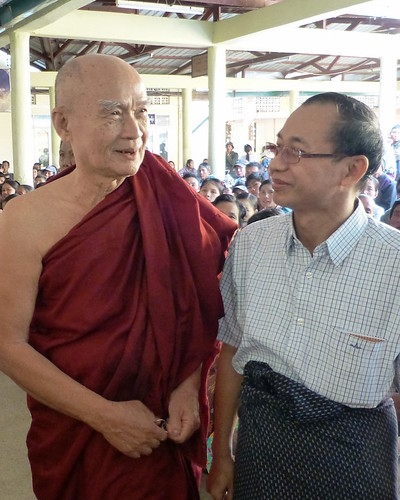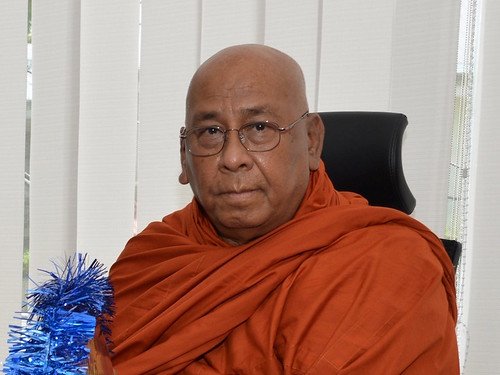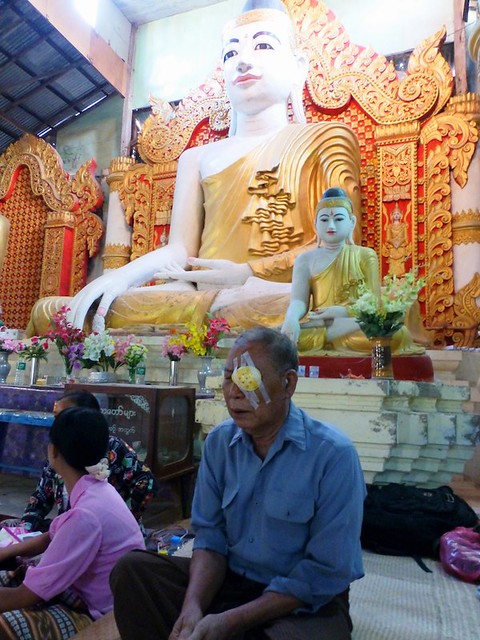FEATURES|COLUMNS|Dharma Project of the Month (inactive)
The Gift of Sight, the Gift of Dhamma
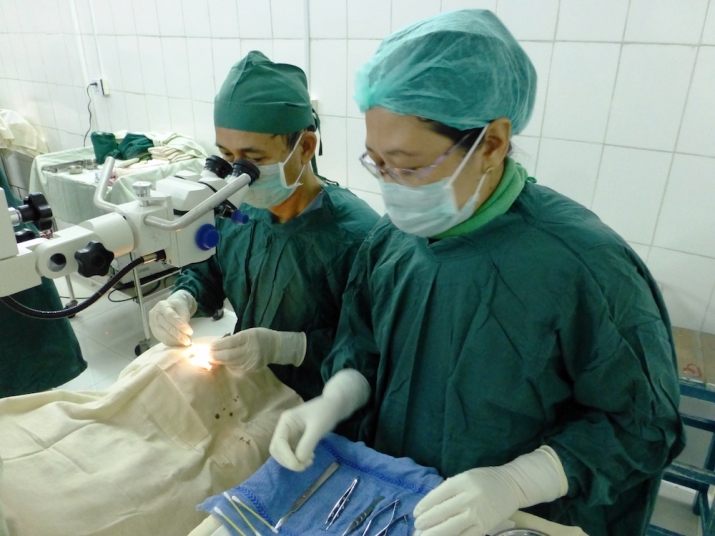 Dr. Sa J. Lwin in the operating theater
Dr. Sa J. Lwin in the operating theaterIt’s 7am on a Saturday and already about 200 people have gathered at Myantaung Monastery in Pantanaw, about a 2-1/2 hour drive from Myanmar’s capital Yangon. Some have spent the night here, having traveled from villages further away the day before, accompanied by a family member. A few people, looking tired and weak, are lying on the floor. Most are elderly and a significant number are wearing eye patches or dark glasses.
The crowd stirs at the arrival of Sayadaw Wimala, the monastery’s chief abbot. Walking beside him is a short man dressed in a simple short-sleeved shirt and traditional Burmese longyi. It is easy to miss this unassuming man in a crowd, but what Dr. Sa J. Lwin may lack in physical stature is more than made up for by his compassionate heart. For the last 20 years, Dr. Lwin has spent almost every weekend offering his ophthalmological services to the underprivileged through charity eye clinics across the country—from Yangon to remote villages in the country’s mountainous north. There is no reward or recognition for Dr. Lwin, only the satisfaction of seeing the happy faces of patients whose sight he has restored.
This weekend, I am accompanying Dr. Lwin on this trip to Pantanaw, his hometown. He is especially glad to be at Myantaung Monastery; his parents have been faithful devotees of the monastery and close friends of Sayadaw Wimala. Old and dilapidated in some parts, the monastery has no shining pagoda or ornate shrine hall. But what matters is that it has a medical block with rooms for otolaryngology, ophthalmology, and a fully equipped operating theater.
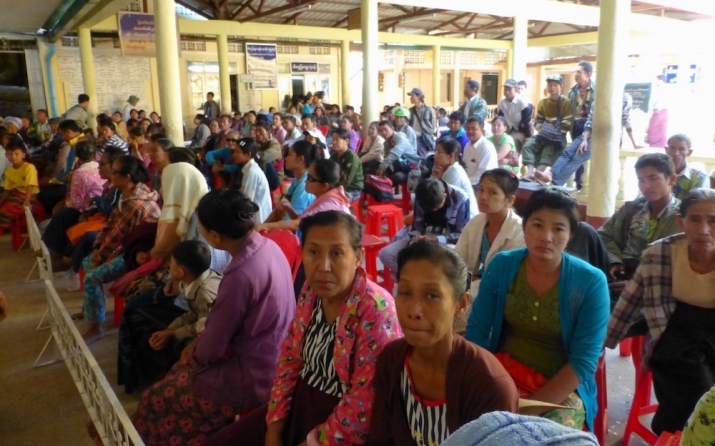 The crowd waits patiently at the charity clinic in Myantaung Monastery
The crowd waits patiently at the charity clinic in Myantaung MonasteryAt this charity clinic, Dr. Lwin, assisted by his wife Daw Moe Moe, four volunteer nurses, and a junior doctor, will treat some 400 outpatients and perform about 80 cataract operations over the two days. Patients undergoing surgery will spend a night in a makeshift recuperative ward in the monastery. The following day, Dr. Lwin will conduct post-operative examinations to ensure that the procedures went well, before prescribing medication and discharging them. Only when the last patient has left will Dr. Lwin and his team head back to Yangon.
Of Myanmar’s estimated 60 million people, around 70 per cent live in rural or remote regions where the rate of blindness is more prevalent—with cataracts accounting for more than 63 per cent of these cases. Many who are affected become blind because they do not have access to diagnosis and treatment, or the means to pay for it.*
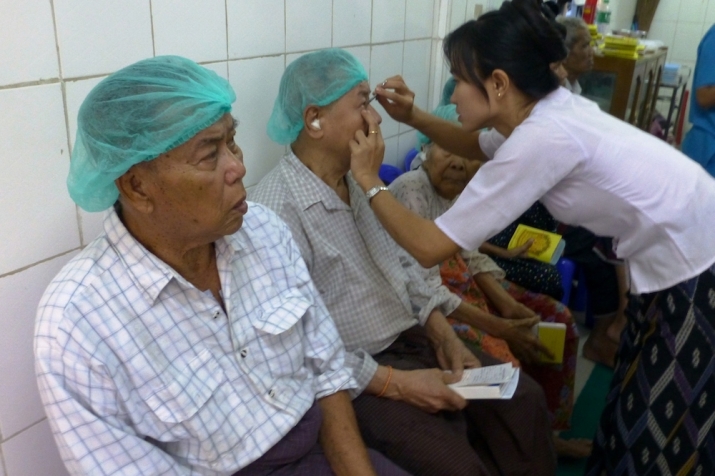 Preparing a patient for surgery
Preparing a patient for surgeryBut, as Dr. Lwin points out, “In many cases, blindness is avoidable. Despite the fact that cataracts can be easily treated and cataract surgery is considered one of the most cost-effective interventions, many avoid seeking treatment because of the costs involved. A simple cataract operation can cost 30,000–40,000 kyat (US$25–35), which is unaffordable for many living in remote rural areas making a living by farming or as manual laborers. So by the time they come to us, their conditions have often deteriorated so badly we cannot do anything. It’s a vicious cycle; visual impairment restricts their ability to work, driving them further into poverty.”
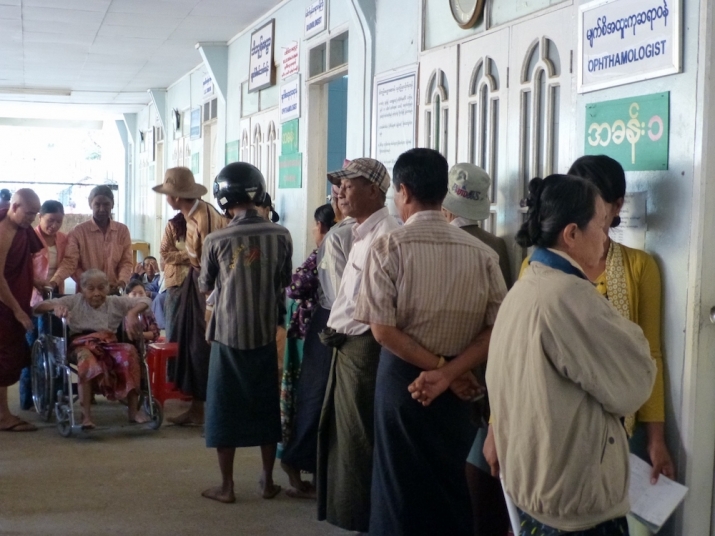 An orderly queue outside the diagnostic room
An orderly queue outside the diagnostic roomLooking at the crowd waiting patiently outside the diagnostic room, Dr. Lwin remarks, “For many of these people, happiness is simply spending time with their children and grandchildren, going to the temple to make an offering, and living in peace and harmony. What good are luxurious bungalows and fancy cars if one cannot see?” He points to a few sacks of potatoes and packets of tea in the room, “They have little and certainly cannot afford to pay for eye surgery, but they are very happy to offer what they have.”
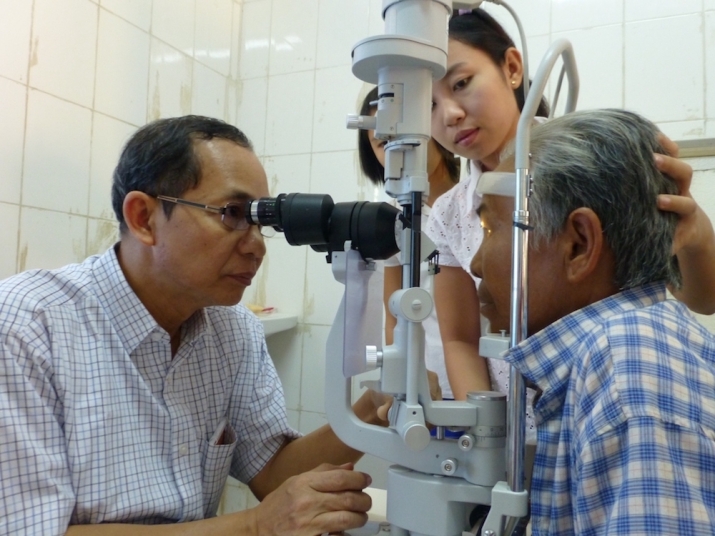 Dr. Lwin examines a patient in the charity clinic
Dr. Lwin examines a patient in the charity clinicDr. Lwin’s obvious concern for his patients, his compassion and altruism, stem from his deep devotion to the teachings of the Buddha, coupled with strength and guidance from his teacher, Sayadaw Sitagu Dr. Ashin Nyanissara, one of Myanmar's most respected monks.
A strong advocate of socially engaged Buddhism and humanitarian work, Sayadaw Sitagu heads Myanmar’s largest charity, the Sitagu International Buddhist Missionary Association, which operates more than 20 charity hospitals throughout the country, 16 of which are dedicated to sight. In addition, it has set up charity clinics at monasteries across the country to facilitate volunteer doctors such as Dr. Lwin to work effectively.
The resolution that Sayadaw has prescribed for the hospitals is: “With no thought of pride or glory, with utmost humility, we resolve to make better the world we live in, and to promote our sāsanā to the best of our ability.”**
For patients who are too poor, Sayadaw sees to it that all food, accommodation, medical services, and even transportation are provided for them and their families. Dr. Lwin explains: “Sayadaw Sitagu not only wants to restore the eyesight of his patients, but at the same time to give them a vision of the Dhamma.”
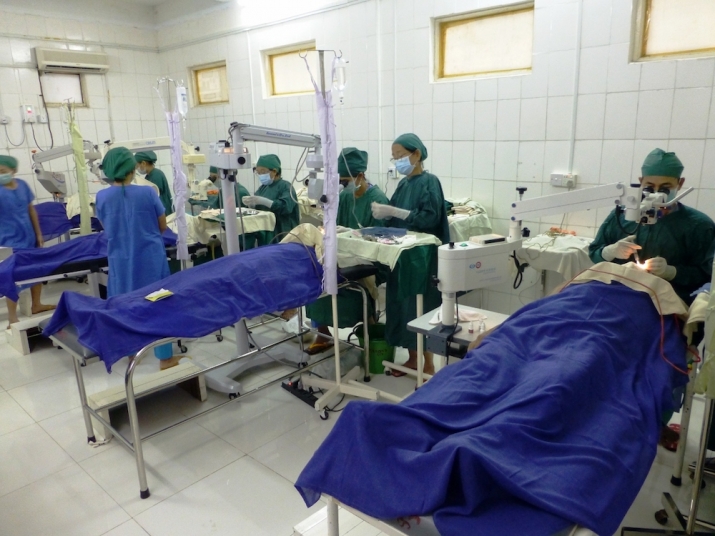 The basic operating theater has four operating tables
The basic operating theater has four operating tablesTo support Sayadaw’s vision, Dr. Lwin has made it his life mission to bring the gift of sight to the poor and underprivileged, regardless of race or religion, and regardless of their ability to pay. All treatment at the charity clinic, including intraocular lenses, is provided free of charge. Funding comes either from generous donors or from Dr. Lwin himself. For the doctor and his wife, the charity clinics have become regular weekend affairs that sometimes stretch into a week or more.
Daw Moe Moe observes with a wry smile: “This means closing the clinic in Yangon and having no income at all.” In response, Dr. Lwin laughs, “Yes but we never worry. When you work with the right intentions, you are always blessed. Each time the bandages are removed and you see the pure joy on their faces, you feel happy. It is something no money can buy.”
“We don't know what will happen tomorrow,” he says. “I am fortunate to have these skills so I must make the best use of them to help others, to lessen the suffering of my brothers and sisters. As a doctor, my mission is to serve as long as I can and as much as I am able to. There are so many people who need help. We cannot perform miracles but if we can make a difference in people’s lives now, that is enough.”
I watch as Dr. Lwin delicately removes the dressing from patient Daw Khin Saw’s left eye. It takes a moment for her to adjust to her surroundings, then suddenly, overwhelmed by emotion, she takes the doctor's face with her wrinkled hands and breaks into a toothless grin. Her happiness and joy fill the room.
Dr. Lwin says he has lost count of the number of patients he has treated and the number of cataract operations he has performed over the years. But for each of those who have regained their sight, it has made all the difference in the world. For Daw Khin Saw, it means she will be able to see her grandchildren for the first time. For another patient, Myint Nu, it means he can return to work on his farm to live a productive and fruitful life with his family.
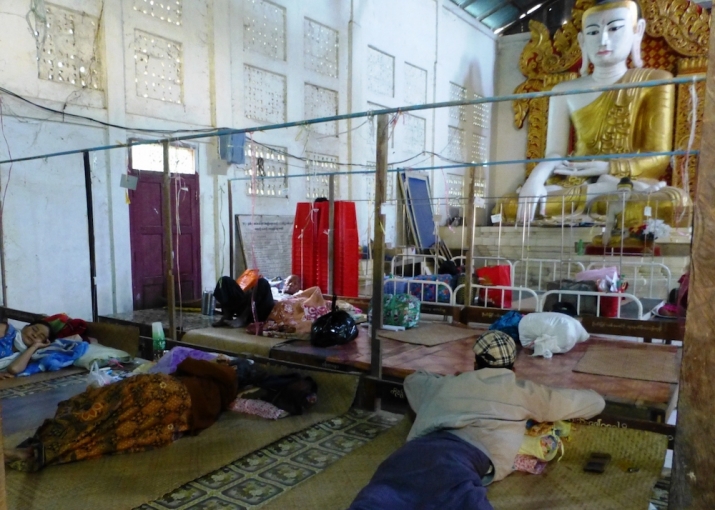 The makeshift recuperation ward
The makeshift recuperation wardAs I reflected on Dr. Lwin’s selfless dedication, I am reminded of the words of author and political activist Helen Keller: “Although the world is full of suffering, it is also full of the overcoming of it.”
* http://www.hollows.org/au/what-we-do/where-we-work/south-east-asia/myanmar
** http://www.eyemyanmar.com/?page_id=134
See more
Sitagu International Buddhist Missionary Association (SIMBA)

